The shoe industry stands at a turning point. Major brands now offer animal-free options that match traditional leather in style and durability. You no longer need to sacrifice fashion for your values.
Companies like Nike, Adidas, and Dr. Martens have launched vegan collections. Small brands like Athletics prove that ethical production works on every scale. This shift happened because customers demanded better options.
Traditional shoe-making uses leather, suede, and other animal products. Vegan shoes, on the other hand, use synthetic materials, plant fibers, and recycled components. The result looks the same, but it does not harm animals.
Why does this matter to you? Animal agriculture creates environmental problems. Leather production uses toxic chemicals that pollute water sources. Workers in tanneries face health risks from these chemicals. Vegan alternatives solve these problems while giving you the same style and comfort.
Popular vegan materials include synthetic leather made from polyurethane. Canvas comes from cotton or hemp plants. Rubber boots use natural tree sap or synthetic compounds. Cork provides cushioning in footbeds. Recycled plastic bottles have become shoe uppers in some brands.
You might worry about durability. When you choose quality brands, good vegan shoes last as long as leather ones. Some synthetic materials resist water better than leather. They also need less maintenance—no special oils or conditioners are required.
Price points vary widely. Budget options start around $30 for basic sneakers, while premium vegan boots can cost $200 or more. The middle range of $60-$120 offers the best value for most buyers.
Major cities now have stores dedicated to vegan fashion. Online shopping gives you access to global brands, and many mainstream retailers mark their vegan options.
You can identify vegan shoes by carefully reading product descriptions. Look for terms like “synthetic upper,” “man-made materials,” or “vegan certified.” Avoid anything mentioning leather, suede, or exotic skins.
What Are Vegan Shoes?
Vegan shoes contain no animal products in any part of their construction. This includes the upper material, lining, insoles, and even the glue used in assembly.
Traditional shoes often use leather for the main body, suede for accents, and animal-based glues. The lining might use pig skin. Even rubber soles sometimes contain animal fats. Vegan alternatives replace every animal component.
Vegan shoes: These five classics are made without animal materials
1. Dr. Martens
Dr Martens created their first vegan boots in response to customer demand. These boots use synthetic leather that looks identical to the original. The company maintains the same construction methods and iconic yellow stitching.
You get the same durability and comfort as traditional Doc Martens. The break-in period feels similar, and most people cannot tell the difference by looking. The price stays competitive with leather versions.
The synthetic material resists water better than leather. You spend less time on maintenance, and no special creams or oils are needed. Simple cleaning with soap and water keeps them looking new.
Dr Martens offers its vegan line in classic black and cherry red. Limited colors are also released throughout the year. The 1460 boot remains the most popular vegan style.
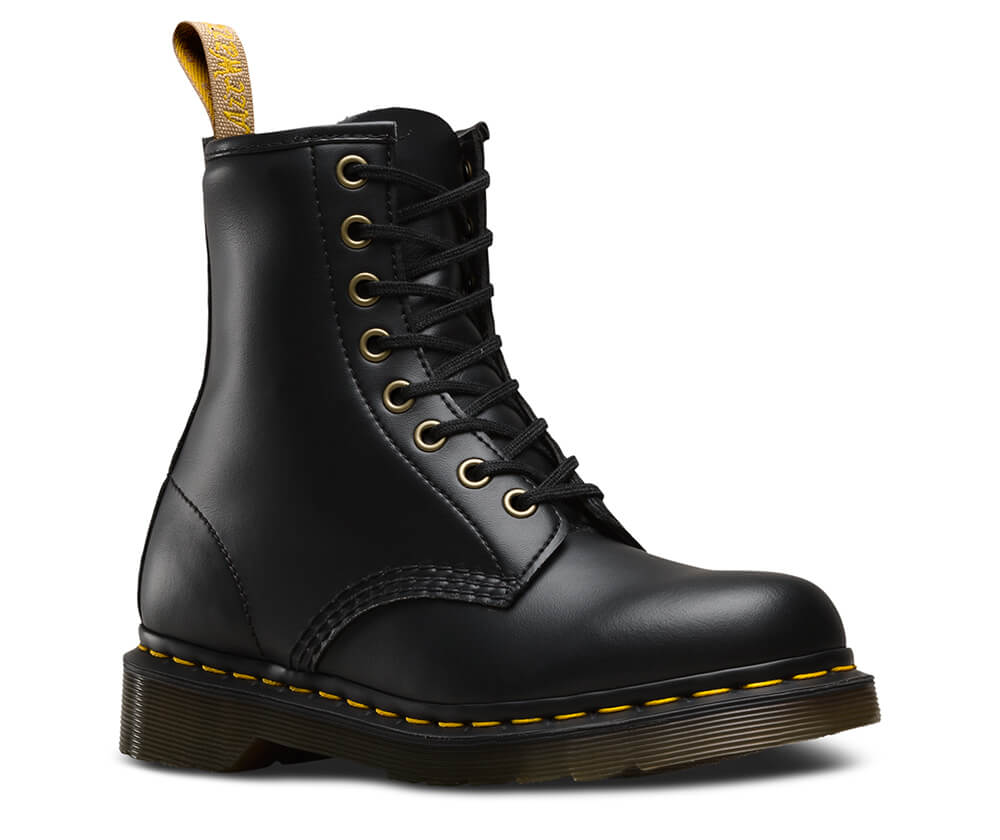
2. Ethletics
Ethletics makes vegan versions of classic canvas sneakers. These shoes use organic cotton canvas and natural rubber soles. The company ensures fair wages for all workers in their supply chain.
The glue contains no animal ingredients. This detail matters because many shoe adhesives use animal products. Ethletics proves that completely vegan production is possible.
When you buy Ethletics, you support ethical labor practices. Workers receive fair wages and safe working conditions, and the company publishes detailed reports about its factories and suppliers.
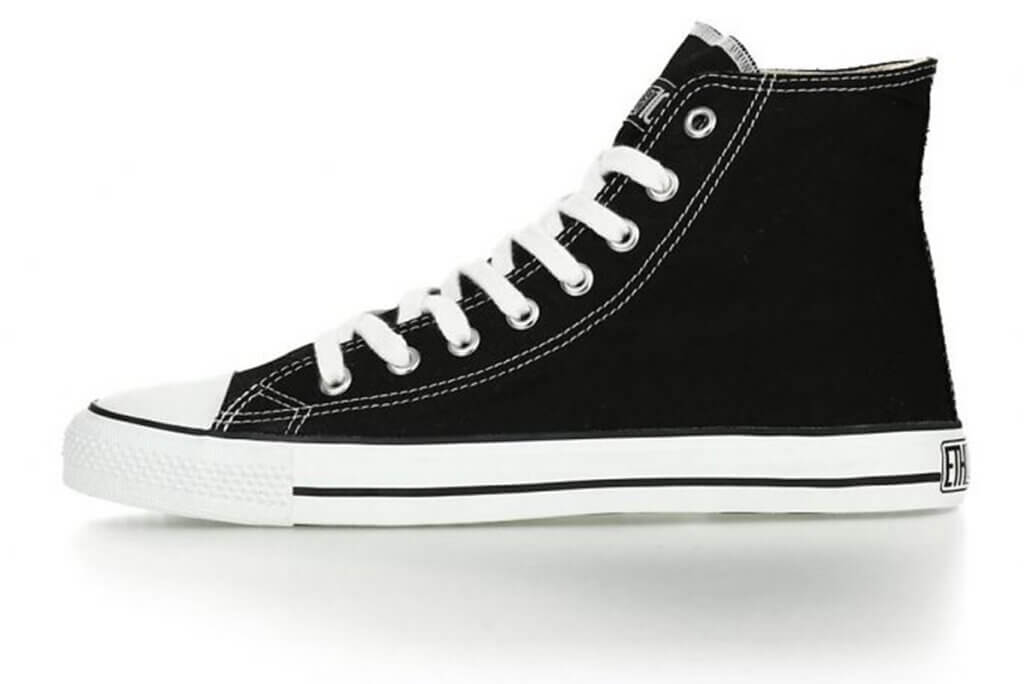
3. Hunter Boots Original
Hunter Boots makes its classic Wellington boots from natural rubber, which comes from rubber trees. This material is naturally vegan, so the shoes resist water completely and last for years.
These boots work well for gardening, festivals, and rainy weather. The non-slip sole provides good traction on wet surfaces. You can clean them with a garden hose.
Hunter offers tall and short versions in many colors. The adjustable strap on tall boots helps them fit different calf sizes, and the cushioned footbed provides comfort for extended wear.
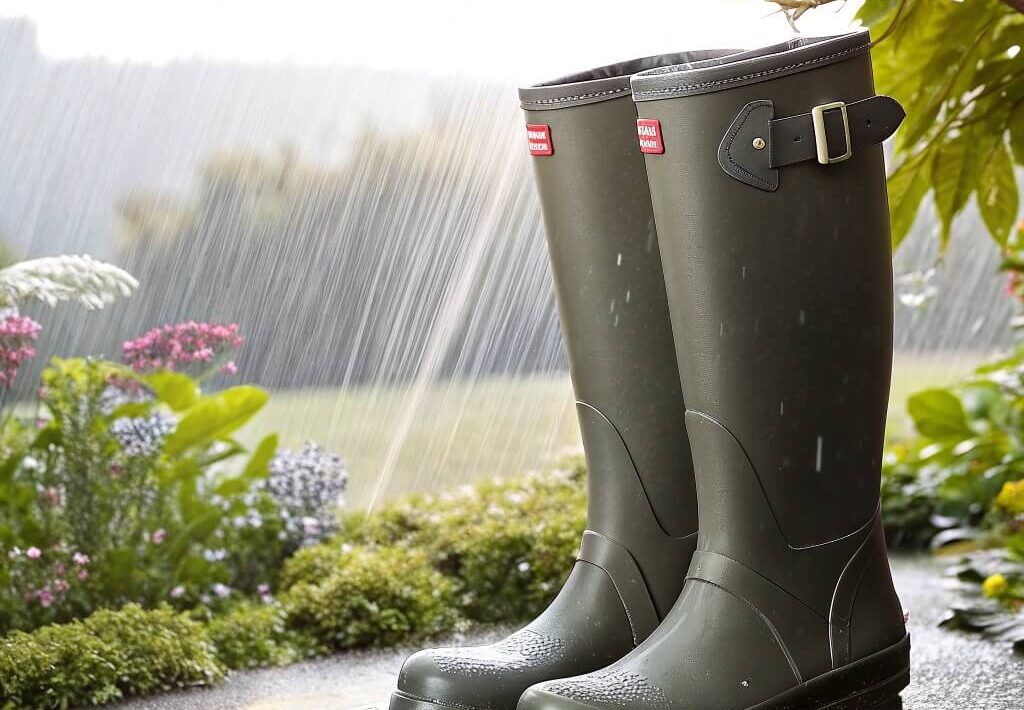
4. Adidas Samba
Adidas makes vegan Samba shoes using synthetic leather. These indoor soccer shoes maintain the classic three-stripe design and have the same performance features as the original leather version.
The synthetic upper breathes well during sports activities. The gum rubber sole provides excellent grip on indoor courts, and the low-profile design works well for casual wear.
Adidas sells these shoes through select retailers only. They are available in white and black, and the price matches the leather version.
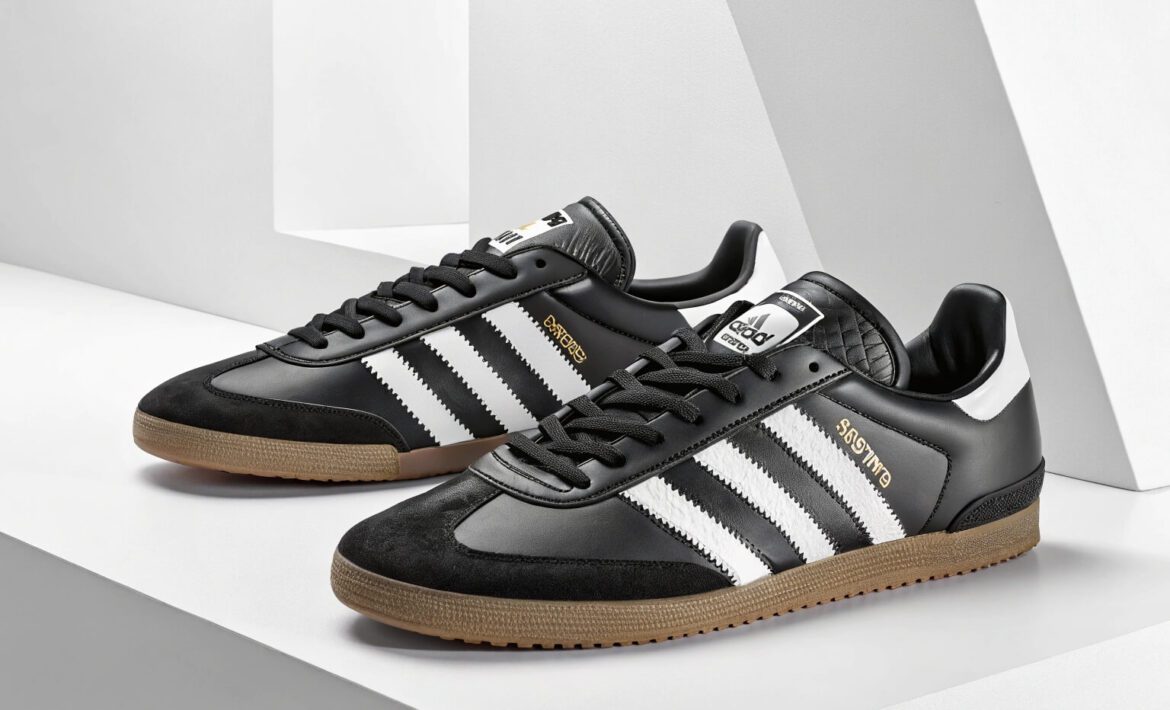
5. Birkenstock Boston
Birkenstock makes vegan Boston clogs using Birko-Flor material. This synthetic material mimics leather texture while providing easy care. The soft fleece lining feels comfortable against bare skin.
You must specify the vegan version when ordering. Birkenstock still makes leather Boston clogs alongside the vegan ones. Check the product description carefully to avoid confusion.
The footbed provides the same arch support as traditional Birkenstocks, and the adjustable strap accommodates different foot widths. These sandals are well-suited for casual wear and light walking.
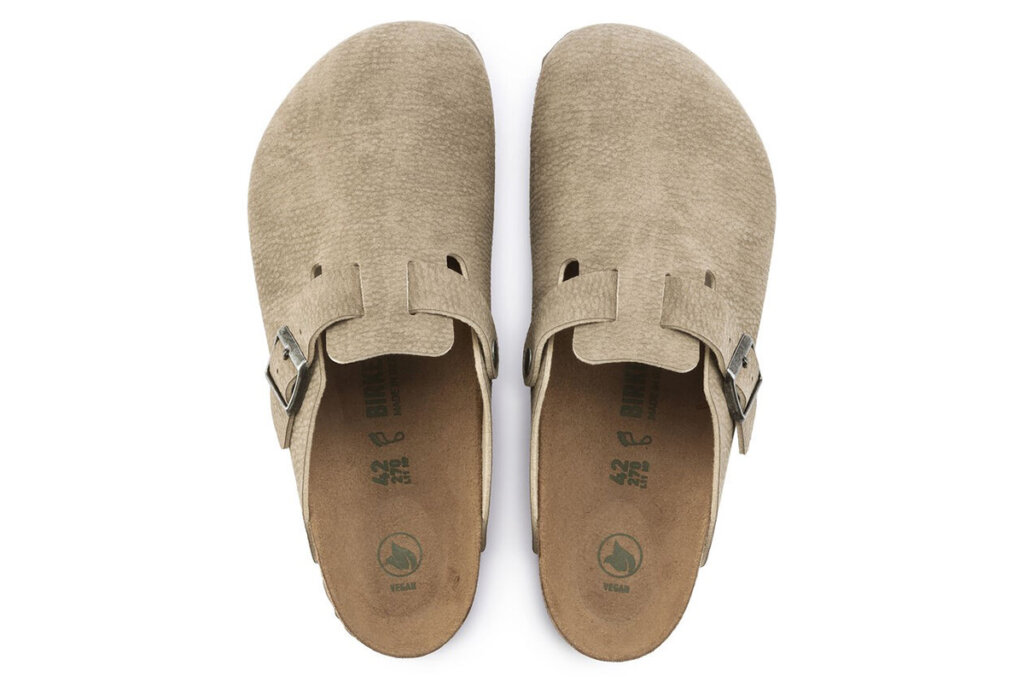
How to tell if shoes are vegan or contain animal cruelty
Generally speaking, finding vegan clothing and shoes is easy once you know what to look for. Here’s how to read labels correctly and which products cause animal suffering.
How to Spot Quality Vegan Shoes
Check the stitching quality first. Good vegan shoes use reinforced seams that will not pull apart. Look for straight, even stitching lines with no loose threads.
Examine the sole attachment. Quality shoes bond or stitch the sole securely to the upper. Avoid shoes with visible gaps or uneven glue lines.
Feel the material thickness. Thin synthetic leather wears out quickly. Quality vegan materials feel substantial and flexible. They should not crack when you bend them gently.
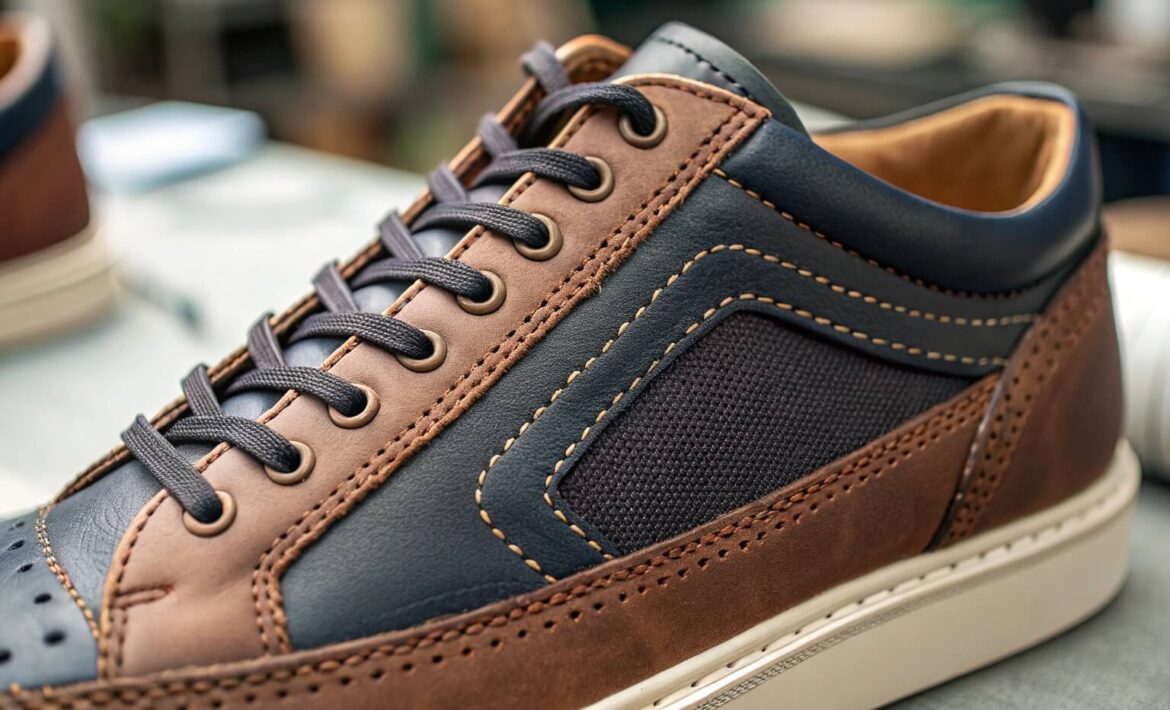
Test the flexibility by bending the shoe at the ball of the foot. Good shoes flex naturally without creasing harshly. Stiff materials will crack over time.
Look for reinforcement in high-wear areas. The toe box and heel should use a thicker material or extra layers. These areas take the most stress during walking.
Check customer reviews for durability feedback. Other buyers will mention if the shoes fall apart quickly. Look for reviews from people who wear the shoes regularly.
Consider the return policy. Quality brands stand behind their products with generous return windows. This shows confidence in their construction methods.
Best Vegan Shoe Materials Explained
Synthetic Leather Options
Polyurethane leather leads the synthetic material market. This plastic-based material mimics real leather texture and appearance. High—quality versions last several years with proper care, while cheaper versions may crack or peel after heavy use.
Microfiber leather offers superior breathability compared to basic synthetics. Its ultra-fine fibers allow air circulation, keeping feet cooler and drier during long wear periods. Athletic shoe brands favour this material for sports applications.
Recycled leather alternatives use ground leather scraps mixed with polyurethane. These materials provide a familiar leather texture while reducing waste. However, they still contain animal products, so strict vegans should avoid them.
Plant-Based Materials
Cork provides excellent cushioning and moisture resistance. This renewable material comes from the bark of cork oak trees. The trees continue growing after harvest, making cork environmentally sustainable. Portuguese shoemakers have used cork for centuries.
Hemp canvas offers remarkable durability for casual shoes. This plant fiber resists mold and UV damage better than cotton, and hemp shoes last longer in humid climates. The material softens with wear while maintaining strength.
Piñatex uses pineapple leaf waste to create a leather-like material. This innovative fabric gives new life to agricultural waste. The texture resembles soft leather with unique natural patterns. Several luxury brands now use Piñatex for limited collections.
Advanced Synthetic Options
Apple leather utilizes waste from the Apple industry to create a flexible shoe material. The process combines apple peels with polyurethane backing. This material works well for dress shoes and casual footwear. Italian companies lead the development of fruit-based leathers.
Mushroom leather grows from mycelium roots in controlled environments. This biological material requires no animal products or petroleum. The texture varies from soft and flexible to firm and structured. Production costs remain high but continue decreasing.
Through advanced processing, recycled plastic bottles become shoe uppers. Companies clean and shred the bottles into small chips. These chips melt into fibers that weave into fabric. One pair of shoes typically uses 6-12 recycled bottles.
Shopping Guide: Where to Find Vegan Shoes
Online Retailers and Specialty Stores
Amazon carries extensive vegan shoe collections from major brands. Use the filter options to narrow results by material type. Read customer reviews carefully for sizing and durability feedback. Prime shipping gets shoes to you quickly for trying on.
Zappos marks vegan shoes in its product descriptions. Its return policy allows you to order multiple sizes and return what does not fit. Customer service representatives can answer specific questions about the materials used.
ASOS features dedicated vegan fashion sections, including footwear. It carries both budget and premium brands. International shipping reaches most countries, and student discounts significantly reduce prices.
Mooshoes specializes exclusively in vegan footwear and accessories. This New York-based retailer stocks hard-to-find brands. Its staff thoroughly understands vegan materials. Mooshoes offers both online shopping and physical store visits.
Brand Websites and Direct Sales
Nike’s website includes a sustainability filter for finding vegan options. Their customer service can confirm which shoes contain no animal products. Nike members get early access to new vegan releases.
Adidas clearly labels its vegan shoes in product descriptions. Their online customization tool lets you design personalized vegan sneakers. The company ships worldwide with tracking included.
Dr Martens maintains a separate vegan collection page on its website. It shows detailed material information for each style. Size guides help you choose correctly since vegan materials may fit differently.
Physical Store Shopping Tips
REI stocks vegan hiking boots and outdoor footwear. Their staff can help identify animal-free options for specific activities. The co-op membership program provides annual dividends on purchases.
Target carries affordable vegan shoe options in most locations. Before purchasing, check the materials list on the shoe boxes. Their return policy allows exchanges if the shoes do not work out.
DSW shoe stores stock vegan options from multiple brands. Sales associates can check computer systems for material details. End-of-season sales offer significant discounts on vegan styles.
What to Look for in Product Descriptions
Search for terms like “synthetic upper,” “man-made materials,” or “vegan certified.” These phrases indicate animal-free construction. Avoid products mentioning leather, suede, or exotic skins anywhere in the description.
Check the sole material information. Rubber soles are typically vegan, but some contain animal fats. Synthetic soles clearly state their vegan status. When in doubt, contact customer service for clarification.
Please read the care instructions carefully. Vegan shoes often require different cleaning methods than leather shoes; some synthetic materials cannot handle certain cleaners or conditioners.
Look for third-party vegan certifications from organizations like PETA or the Vegan Society. These certifications require companies to verify all materials and production methods.
Price Ranges and Value Considerations
Budget vegan shoes under $50 work well for occasional wear. These shoes use basic synthetic materials that may not last as long. Canvas sneakers and simple flats fall into this category. They serve well for trying vegan footwear before investing more.
Mid-range options from $50 to $150 offer the best value for regular wear. These shoes use higher-quality synthetic materials with better construction. Most athletic shoes and casual boots fall into this price range. You get good durability without premium pricing.
Luxury vegan shoes cost $150 and above but provide exceptional quality. These shoes often use innovative materials like mushroom leather or recycled ocean plastic. Their construction methods match traditional high-end footwear. With proper care, they last several years.
Seasonal Shopping Strategies
End-of-season sales offer the best prices on vegan footwear. Winter boots are sold in early spring, and summer sandals are marked down in late fall. If you find styles you like, stock up during these periods.
Black Friday and Cyber Monday feature significant discounts from major brands. Many companies offer additional discounts on vegan collections. Sign up for brand newsletters to get early sale notifications.
New style releases happen seasonally, pushing older models to clearance. Previous years’ colors often go on deep discounts. The construction quality remains the same at lower prices.
International Shopping Considerations
European brands often lead in vegan shoe innovation. Shipping costs can be high, but quality justifies the expense. Check import duties and taxes before ordering internationally.
UK brands like Vegetarian Shoes and Beyond Skin ship worldwide. These companies specialize exclusively in vegan footwear. Their expertise shows in material selection and construction quality.
Vegan shoes have reached quality levels that match traditional leather footwear. When choosing animal-free options, you no longer need to compromise on style, comfort, or durability. Major brands now offer extensive vegan collections that serve every need, from athletic performance to formal occasions.
The material science behind vegan shoes continues to advance rapidly. Innovations like mushroom leather and fruit-based materials provide exciting alternatives to petroleum-based synthetics, pointing toward a more sustainable future for the footwear industry.
Your purchasing decisions drive market demand for better vegan options. Every pair of vegan shoes you buy signals to manufacturers that consumers want cruelty-free alternatives. This demand encourages continued innovation and investment in research on vegan materials.
Begin your vegan shoe journey with a pair in a style you wear often. Test the comfort and durability before expanding your collection. Most people find that quality vegan shoes exceed their expectations for both performance and longevity.
The transition to vegan footwear supports multiple positive outcomes. You reduce animal suffering while often choosing more environmentally sustainable options. Many vegan shoe companies also prioritize fair labor practices and ethical manufacturing.
Your feet deserve comfortable, stylish shoes that align with your values. Vegan footwear delivers on all these requirements while contributing to positive change in the fashion industry. The five classic styles covered in this guide provide excellent starting points for building a completely animal-free shoe collection.



